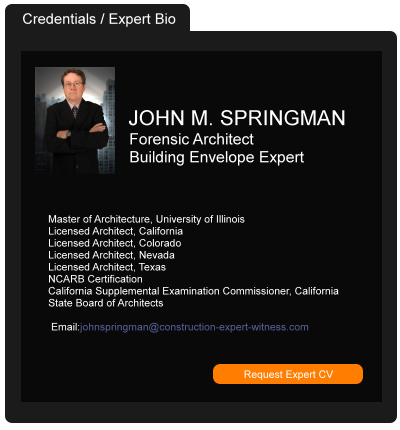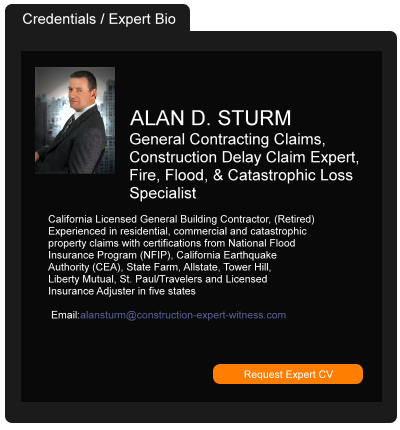Housing Starts in U.S. Slumped More Than Forecast in March
April 20, 2016 —
Sho Chandra – BloombergNew-home construction in the U.S. slumped more than projected in March, reflecting a broad-based retreat that showed the industry lost momentum heading into the busiest time of year.
Residential starts decreased 8.8 percent to a 1.09 million annualized rate that was the lowest since October and weaker than any forecast of economists surveyed by Bloomberg, Commerce Department data showed Tuesday in Washington. Permits, a proxy for future construction, also dropped.
Read the court decisionRead the full story...Reprinted courtesy of
Sho Chandra, Bloomberg
Judge Gives Cintra Bid Protest of $9B Md. P3 Project Award New Life
March 21, 2022 —
Jim Parsons - Engineering News-RecordThe Maryland Dept. of Transportation will have to reconsider a protest lodged by the losing bidder for the initial phase of its $9-billion Express Lanes project, according to a Feb. 17 state circuit court judge's ruing. The decision likely stalls the state's ambitious plan to add capacity along portions of the I-495/Beltway and I-270 west of Washington, DC, using a progressive public-partnership.
Reprinted courtesy of
Jim Parsons, Engineering News-Record
ENR may be contacted at enr@enr.com
Read the full story... Read the court decisionRead the full story...Reprinted courtesy of
Agree First or it May Cost You Later
May 08, 2023 —
Bill Wilson - Construction Law ZoneBusiness relationships often begin before parties execute a written agreement containing the terms and conditions by which the relationship will be governed. With little more than a Letter of Intent (“LOI”) or Letter of Award (“LOA”) one party is typically pressured to begin investing time and money to start preliminary work on a project. If such LOI or LOA contains nothing more than an agreement to agree later, the performing party should minimize its investment until the later agreement is executed. A recent court decision in New York confirmed the danger to the performing party under “agreement to agree” provisions.
In Permasteelia North America Corp. v. JDS Const. Group, LLC, 2022 WL 2954131 (N.Y. Sup. CT. 7/22/22), the plaintiff subcontractor allegedly performed $1.9 million worth of preliminary work under nothing more than a LOA with an agreement to agree provision. Issues arose, and the parties never entered any later written agreement. The general contractor refused to pay the plaintiff anything for its preliminary work. In response, the plaintiff filed suit against the general contractor asserting four counts: foreclosure of its lien, breach of contract, unjust enrichment, and account stated. All four counts were based on an alleged oral “handshake deal” for subcontract work for the project. The general contractor’s LOA stated that neither party would be bound “unless and until the parties actually execute a subcontract.” During discovery, the plaintiff admitted that neither party intended to enter into any contract until its potential terms were negotiated, reduced to writing, and signed. Moreover, the plaintiff only offered one set of meeting minutes and a few project agendas to support its alleged “handshake deal.” Once these necessary undisputed facts were confirmed, the defendant moved for summary judgment on all four counts.
Read the court decisionRead the full story...Reprinted courtesy of
Bill Wilson, Robinson & Cole LLPMr. Wilson may be contacted at
wwilson@rc.com
ASCE Joins White House Summit on Building Climate-Resilient Communities
October 09, 2023 —
The American Society of Civil EngineersRESTON, Va. – The White House Climate Policy Office hosted the Summit on Building Climate Resilient Communities today and unveiled its
National Climate Resilience Framework for communities to build more resiliently as they face increasingly severe weather events. The framework features comprehensive recommendations and opportunities for action, including partnerships between federal agencies and leading standards development organizations such as the
American Society of Civil Engineers (ASCE), to improve the resilience of buildings and other infrastructure. ASCE president Maria Lehman, P.E., was in attendance for the Summit.
ASCE's most widely adopted standard,
ASCE 7-22, is the primary reference of structural design requirements in all U.S. building codes and is updated every six years to reflect the latest data and trends presented by an ever-changing climate. Its most recent update, published in 2022, includes updates to environmental hazards used for building design including new wind speeds along the hurricane coastline, a completely new chapter for tornado loads, and the most substantial update to its chapter on flood loads since the inception of ASCE 7-22 – calling for structures to be built to withstand 500-year floods rather than the previous standard of 100-year flood mitigation.
Although modern codes and standards, such as ASCE 7-22, can mitigate climate hazards, many communities throughout the U.S. have not yet adopted these practices. The new White House framework calls for ensuring federal funding requires climate-resilient infrastructure investments by encouraging government at all levels to adopt consensus-based engineering standards, which would go a long way towards addressing vulnerabilities posed by future climate impacts.
ASCE, in conjunction with industry leaders represented at the Summit, supports federal efforts to improve climate data, enforce the most stringent codes and standards, and provide technical assistance to building and infrastructure stakeholders. To learn more about environmental hazard mitigation resources, follow
ASCE's Pathways to Resilient Communities Toolkit, a plain-language guide for federal, state, and local leaders as they seek out standards, best practices, data, and strategies that can be implemented to safeguard communities across the country from increasingly severe weather events.
ABOUT THE AMERICAN SOCIETY OF CIVIL ENGINEERS
Founded in 1852, the American Society of Civil Engineers represents more than 150,000 civil engineers worldwide and is America's oldest national engineering society. ASCE works to raise awareness of the need to maintain and modernize the nation's infrastructure using sustainable and resilient practices, advocates for increasing and optimizing investment in infrastructure, and improve engineering knowledge and competency. For more information, visit www.asce.org or www.infrastructurereportcard.org and follow us on Twitter, @ASCETweets and @ASCEGovRel.
Read the court decisionRead the full story...Reprinted courtesy of
MDL for Claims Against Manufacturers and Distributors of PFAS-Containing AFFFs Focuses Attention on Key Issues
July 05, 2021 —
Gregory S. Capps & Lynndon K. Groff - White and Williams LLPClaims against manufacturers and distributors of per- and polyfluoroalkyl substances (PFAS)-containing aqueous film-forming foam (AFFF) are hurtling forward. Two important developments in this opening salvo of PFAS-related claims against numerous defendants could have important ramifications not only on future PFAS litigation, but on insurance coverage for potential PFAS liabilities as well. First, ten bellwether cases are progressing closer to trial. Second, the key “government contractor defense” has been slated for briefing.
In December 2018, the Judicial Panel on Multi-District Litigation established a multi-district litigation (MDL 2873) for AFFF PFAS claims in the United States District Court for the District of South Carolina. Unlike previous PFAS lawsuits (primarily against DuPont and/or 3M), the lawsuits in MDL 2873 target dozens of defendants who manufactured and distributed AFFF and its constituent chemicals. MDL 2873 now houses approximately 1,200 member cases, which include the following categories of claims: (i) claims for property damage asserted by water providers, (ii) claims for property damage asserted by property owners, (iii) bodily injury claims, and (iv) claims for medical monitoring for potential future injury.
Reprinted courtesy of
Gregory S. Capps, White and Williams LLP and
Lynndon K. Groff, White and Williams LLP
Mr. Capps may be contacted at cappsg@whiteandwilliams.com
Mr. Groff may be contacted at groffl@whiteandwilliams.com
Read the court decisionRead the full story...Reprinted courtesy of
Real Estate & Construction News Round-Up (01/25/23) – Artificial Intelligence, Proptech Innovation, and Drone Adoption
February 14, 2023 —
Pillsbury's Construction & Real Estate Law Team - Gravel2Gavel Construction & Real Estate Law BlogThis week’s round-up explores new artificial intelligence tools and their projected impact on real estate agents, key trends driving proptech innovation, barriers to adopting drones in the construction industry, and more.
- Artificial intelligence (AI) has the potential to become an invaluable tool to streamline the selling journey of a property, empower buyers to make informed decisions, and enhance the work of real estate agents. (Alexandra Cain, The Urban Developer)
- Miami real estate agents experiment with the new artificial intelligence tool, ChatGPT, which can generate text based on simple prompts, to write house listings, communicate with developers, and produce content. (Martin Vassolo, Axios)
- Asset owners in Asia and Europe turn to artificial intelligence to collect ESG information across public and private markets, including from residential buildings in Japan. (Hugo Cox, Asian Investor)
Read the court decisionRead the full story...Reprinted courtesy of
Pillsbury's Construction & Real Estate Law Team
Licensing Reciprocity Comes to Virginia
May 15, 2023 —
Christopher G. Hill - Construction Law MusingsRemember my admonishment to get your
Virginia contractor’s license? Well, that will get easier for experienced construction professionals that hold a license from a state or territory outside of Virginia beginning on July 1, 2023. In this past session of the General Assembly, the Youngkin administration pushed and the legislature passed a universal licensure statute that (with some exceptions for professional services as defined in
Va. Code 2.2-4301) will allow those (including contractors) who are licensed in other states to use that license to obtain a Virginia license.
The
new legislation will require DPOR to recognize another state’s license where the contractor meets the following requirements:
- The individual holds a current and valid professional or occupational license or government certification in another state in a profession or occupation with a similar scope of practice, as determined by the board in the Commonwealth
Read the court decisionRead the full story...Reprinted courtesy of
The Law Office of Christopher G. HillMr. Hill may be contacted at
chrisghill@constructionlawva.com
Colorado Statutes of Limitations and Repose, A First Step in Construction Defect Litigation
December 20, 2012 —
CDJ STAFFGrund Dagner, a law firm operating in Denver and Boulder, Colorado notes on their blog that when defending a construction defect claim, one of their first steps is to determine if the claims are affected by the statutes of limitations or repose, and that they “have had much success raising these defenses with the court before trial.”
Colorado has a two-year statute of limitations, starting from when the homeowner discovers the defect. Further, Colorado’s statute of repose precludes lawsuits beginning “more than six years after the substantial completion of the improvement to the real property.”
Grund Dagner notes that they “recently obtained dismissal of claims related to eight of 22 buildings in a condominium project, where the homeowners in those building observed the defects more than two years before the HOA initiated its claims against our client.”
Read the court decisionRead the full story...Reprinted courtesy of


































































